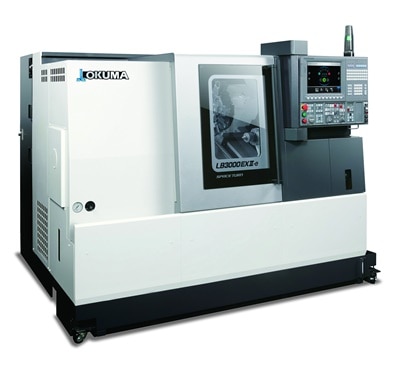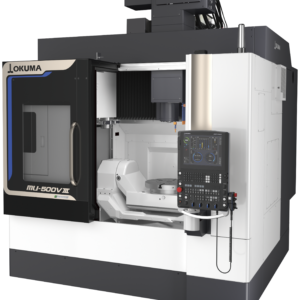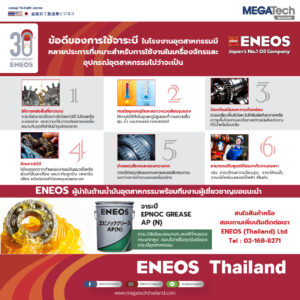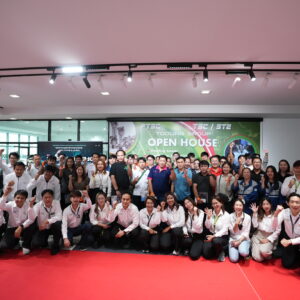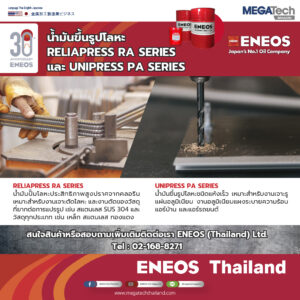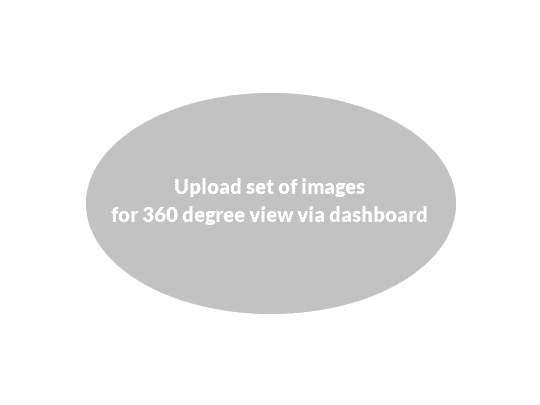ในปี ค.ศ. 1961 เราได้พัฒนาเครื่องเจาะรัศมี (Radial Boring Machine) ที่มาพร้อมกับ NC คอนโทรลเลอร์ โดยความร่วมมือกับผู้ผลิตไฟฟ้า และคอยให้บริการลูกค้าด้วยเครื่องจักร คอนโทรลเลอร์ และเทคโนโลยีที่นำสมัยตลอดมา
ในบทความนี้ เราจะแนะนำให้รู้จักประวัติศาสตร์ของคอนโทรลเลอร์ตัวเลขที่เราพัฒนาขึ้นเอง คือ OSP (OKUMA Sampling Path Control)
ในปี ค.ศ. 1963 เราเชื่อว่า วิธีการที่ไม่ลบความจำของจุดกำเนิด (Origin) และที่ตั้งของเครื่องมือ แม้ว่าไฟจะดับไปแล้ว จะส่งผลดีเยี่ยมต่อการทำงานและความเชื่อมั่น (Reliability) เราจึงพัฒนาคอนโทรลเลอร์รุ่น “Absolute Position Detection” NC Controller

โดยที่เราได้เริ่มควบคุมซอฟต์แวร์ ด้วยความมุ่งหมายที่จะทำให้เกิดความเชื่อมั่นและประสิทธิภาพการทำงานที่สูงขึ้น และในปี ค.ศ. 1972 เราได้พัฒนาเครื่องจักร CNC ที่มีความสามารถในการใช้งานพร้อมกับมินิคอมพิวเตอร์ในตัว ซึ่งล้ำหน้ารายอื่นๆ ในโลก
นอกจากนี้ เราได้พัฒนาเซอร์โวมอเตอร์ในปี ค.ศ. 1982 และได้ผลิตมอเตอร์ (Motor) เซอร์โวไดร์ฟ (Servo Drive Unit) ตัวตรวจจับ (Detector) และพัฒนาการทางด้านเทคโนโลยีอื่นๆ ที่จำเป็นในสายการทำงาน

คอนโทรลเลอร์รุ่นล่าสุด OSP-P300A ได้ทำให้เกิด “การปฏิวัติทางการผลิต” ของลูกค้าในหลายด้าน เช่น ชุดการทำงาน OSP Suite ที่มีข้อมูลและความสามารถในการทำงานที่จำเป็นต่อการดำเนินการในสถานที่ผลิต และมี Connect Plan ที่ส่งเสริมการวิเคราะห์เพื่อพัฒนาอัตราการทำงานโรงงาน
เครื่องจักร CNC อัจฉริยะเน้นหน้างาน
ให้ความสำคัญกับการใช้งานง่ายที่หน้างานเป็นอับดับหนึ่ง
นำเอาความต้องการของลูกค้าที่หน้างานขึ้นรูปมารวมกับโนว์ฮาวการขึ้นรูปของโอคุม่าแล้วทำให้เป็นรูปธรรมขึ้นมา
เนื่องจากเป็นอุปกรณ์ ในเครื่องจักร CNC ซึ่งผู้ผลิตเครื่องจักรแมชชีนทูลทำขึ้น จึงเต็มไปด้วยปัญญาที่จะเพิ่ม “พลังของหน้างาน” อยู่ภายใน

ไกด์เทิร์นนิ่งคัท
ทำให้สามารถใช้เทคโนโลยีขึ้นรูปใหม่ๆ ได้โดยง่าย
เทิร์นนิ่งคัทเป็นฟังก์ชั่นเฉพาะของโอคุม่าที่สามารถทำการกลึงได้ด้วยแกนหลักงานกัด ด้วยการควบคุมพร้อมกันระดับสูง ทำให้สามารถขึ้นรูปรูเทเปอร์และขนาดเส้นผ่านศูนย์กลางต่างๆได้ด้วยเครื่องมือชิ้นเดียว รวมทั้งสามารถขึ้นรูปขนาดเส้นผ่านศูนย์กลางของรอบวงในและรอบวงนอกที่มีขนาดใหญ่กว่าขนาดเส้นผ่านศูนย์กลางเครื่องมือสูงสุดได้
หลังจากที่ตั้งเงื่อนไขการขึ้นรูปตามรูปที่แนะนำและป้อนความเร็วรอบแล้ว เครื่องจะคำนวณระดับความกลมในความเร็วรอบนั้นให้หากป้อนระดับความกลมเข้าไป เครื่องจะคำนวนความเร็วรอบที่เหมาะสมที่สุดเพื่อให้ได้ระดับความกลมนั้น
การมอนิเตอร์กำลังของแกนหลัก
การเพิ่มความสามารถในการผลิตด้วยการทำให้มองเห็นกำลังที่เหลืออยู่ของมอเตอร์
ทำการแสดงกำลังของแกนหลักที่ถูกกำหนด (เส้นแดง: พิกัดช่วงระยะเวลาสั้น,เส้นเขียว:พิกัดต่อเนื่อง) และกำลังของแกนหลักที่กำลังขึ้นรูปอยู่ในปัจจุบัน (วงกลมสีน้ำเงิน) บนหน้าจอพร้อมกัน ทำให้เห็นกำลังที่เหลือในเรียลไทม์สามารถเร่งความเร็วในการขึ้นรูปเช่นเพิ่มความเร็วรอบแกนหลัก,เพิ่มความเร็วป้อนได้โดยดูกราฟไม่ให้วงกลมสีน้ำเงินเกินเส้น
การคำนวณความดันหัวจับในเครื่องจักร CNC
การคำนวณค่าทางทฤษฎีที่จำเป็นในการป้อนข้อมูลรูปแบบกระบอกสูบและหัวจ่าย
ความดันในการจับชิ้นงานที่เหมาะสมเป็นสิ่งจำเป็นที่ขาดไม่ได้ทั้งในด้านความปลอดภัยของการปฏิบัติงานและด้านการรักษาความแม่นตรงของการขึ้นรูป แต่การคำนวณค่านั้นยากและซับซ้อน

ดังนั้นในแอพพลิเคชั่นใหม่ ผู้ใช้เพียงเลือกรูปแบบของกระบอกสูบและหัวจับแล้วตั้งเงื่อนไขในการขึ้นรูปตามรูปที่แนะนำ แอพพลิเคชั่นจะคำนวนค่าทฤษฎีของความดันหัวจับที่จะให้แรงบีบที่จำเป็นต่อเงื่อนไขขึ้นรูปนั้น

ควบคุมใช้งานได้ง่ายดั่งสมาร์ทโฟนที่มีในเครื่องจักร CNC
ควบคุมใช้งานด้วยกราฟฟิคที่ตรงตามสัญชาตญาณด้วยการพัฒนาสมรรถนะทางด้านกราฟฟิคให้ดีขึ้นและการใช้มัลติทัชพาเนล สามารถควบคุมใช้งานได้อย่างราบรื่นและรวดเร็วดั่งสมาร์ทโฟนทั้งการเคลื่อนที่,ย่อขยาย,หมุนโมเดล 3D, การแสดงลิสต์โปรแกรมและข้อมูลเครื่องมือฯลฯ

การเลื่อนหน้าจอแบบมีความหน่วงซึ่งช่วยให้หารายการที่ต้องการได้ง่ายในเครื่องจักร CNC
เวลาที่เลื่อนหน้าจอเร็วๆ
แม้ว่าจะยกนิ้วออกแล้วแต่หน้าจอจะไม่หยุดในทันทีแต่ว่าจะเลื่อนต่ออีก
สักพักการค้นหารายการที่ต้องการจากตารางลิสต์เครื่องมือหรือไฟล์โปรแกรมฯลฯง่ายขึ้น
- ฟังก์ชั่นที่ใช้งานกับมัลติทัชได้:Collision Avoidance System,ฟังก์ชั่นสร้างโมเดลโดยง่าย,ฟังก์ชั่นสนทนาอย่างง่ายแบบแอ๊ดวานซ์,PDF・STL viewer, ตารางข้อมูลต่างๆ, การแสดงลิสต์ของไฟล์โปรแกรม, การแก้ไขโปรแกรม

Article by: OKUMA TECHNO (THAILAND) & MEGA Tech

